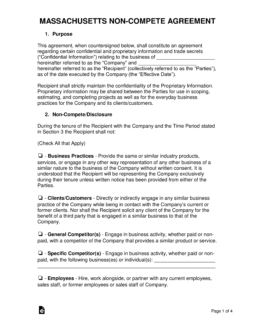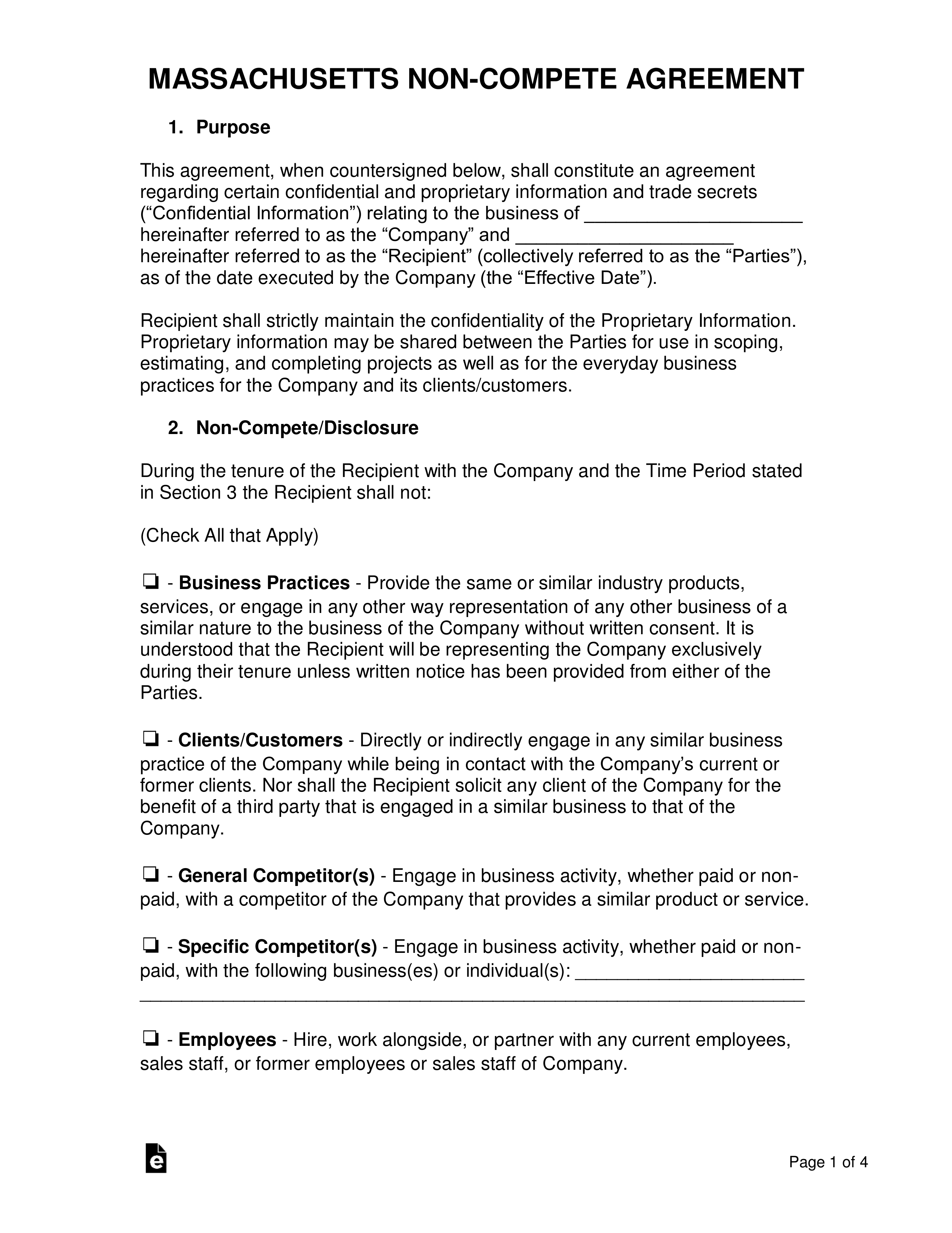Updated March 01, 2024
A Massachusetts non-compete agreement prohibits an individual from participating in certain activities that conflict with the employer’s protected interests. There are a number of employment protections that Massachusetts offers, including employees receiving 50% of their annual pay (pro-rated) during the non-compete period.
Laws
Legally Enforceable?
Yes, a non-compete is legally enforceable in Massachusetts if it meets the following:[1]
- Right to legal counsel. Must be in writing and expressly state that the employee has the right to legal counsel prior to signing;
- 10 days prior to employment. Must be signed within 10 business days before the start of employment;
- Purpose of protecting business interests. The non-compete must be specifically for protecting the employer’s:
- Trade secrets;
- Confidential information; or
- Goodwill.
- Other agreements do not adequately protect. May only be used if other agreements do not adequately protect the employer such as:
- Non-disclosure agreements; or
- Non-solicitation agreements.
- Geographical area. Must be reasonable in geographical reach. It cannot extend further than areas the employee provided services or had a material presence in the last 2 years of employment.
- Specified scope of activities. An employee may only be restricted for the specific scope of activities provided, while employed, for services provided in the last 2 years.
- Payment of 50% of annual salary. Also known as a “garden leave clause,” the employer is required to pay the employee 50% of their annual salary (at its highest yearly point during the last 2 years) pro-rated on an annual basis during the non-compete period.
Restrictions (Occupations and Status)
Massachusetts has the following employment restrictions for non-competes;
- Non-exempt employees under FLSA. Individuals considered non-exempt under the Fair Labor Standards Act, 29 U.S.C. 201-219. Those earning less than $23,600 per year ($455/week)[2];
- Undergraduates or interns. Any type of short-term employment, paid or unpaid, and in connection with an educational institution[2];
- Terminated without-cause. Any employee terminated without cause or laid off;
- Minors. Individuals ages 18 or under[2];
- Nurses. Medically licensed nurses[3];
- Social workers. A social worker is defined as “an individual who by training and experience meets the requirements for licensing by the board and is duly licensed to engage in the practice of social work in the commonwealth.”[4][5]
- Broadcast employees. Includes employees under television and radio stations and networks.[6]
- Lawyers / Attorneys. All licensed attorneys[7]
- Physicians. Any physician licensed to practice medicine[8]
Continued Employment
The continuation of employment alone does not constitute adequate consideration for a non-compete.[9]
The courts have stated that a “material change” in the employee’s compensation or structure must be made. A “material change” may include the employee’s:[10]
- Compensation. A change in the pay structure or compensation.
- Authority. A change of title of position within the organization.
- Change of focus. If the employee’s focus has changed from their previous work.
Sale of a Business
A non-compete that is part of the sale of a business is enforceable if it is reasonable in “time, space, or product line, or obstruction of the public interest.”[11]
Reasonableness
Reasonableness is determined by the court reviewing the following:[12]
- Sales price. The amount of money paid by the buyer;
- Brand of the business. The identity of the sellers with one another and with the corporate name;
- Duration. The term of the non-compete;
- Seller’s association. The importance of the seller’s association with the business; and
- Conduct and statements. The conduct and statements of the seller at the time of the sale.
Maximum Term
A non-compete may only be a maximum of 12 months unless the employee has unlawfully taken property belonging to the employer. Under such illegal possession of property, the non-compete may last for 2 years.[1]
Blue Penciling
A non-compete may be modified only to the extent that it is reasonable if it is too broad in time or geographical area.
If the covenant is too broad in time, in space or in any other respect, it will be enforced only to the extent that is reasonable and to the extent that it is severable for the purposes of enforcement.[13]
“Noncompetition Agreement” Definition
“Noncompetition agreement”, an agreement between an employer and an employee, or otherwise arising out of an existing or anticipated employment relationship, under which the employee or expected employee agrees that he or she will not engage in certain specified activities competitive with his or her employer after the employment relationship has ended. Noncompetition agreements include forfeiture for competition agreements, but do not include: (i) covenants not to solicit or hire employees of the employer; (ii) covenants not to solicit or transact business with customers, clients, or vendors of the employer; (iii) noncompetition agreements made in connection with the sale of a business entity or substantially all of the operating assets of a business entity or partnership, or otherwise disposing of the ownership interest of a business entity or partnership, or division or subsidiary thereof, when the party restricted by the noncompetition agreement is a significant owner of, or member or partner in, the business entity who will receive significant consideration or benefit from the sale or disposal; (iv) noncompetition agreements outside of an employment relationship; (v) forfeiture agreements; (vi) nondisclosure or confidentiality agreements; (vii) invention assignment agreements; (viii) garden leave clauses; (ix) noncompetition agreements made in connection with the cessation of or separation from employment if the employee is expressly given seven business days to rescind acceptance; or (x) agreements by which an employee agrees to not reapply for employment to the same employer after termination of the employee.[14]
Sources
- c.149 § 24L(b)
- c.149 § 24L(c)
- c. 112 § 74D
- c. 112 § 130
- c. 112 § 135C
- c. 149 § 186
- Rules of Professional Conduct Rule 5.6
- c. 112 § 12X
- c.149 § 24L(b)(ii)
- Intepros, Inc. v. Paul Athy (2013)
- Whitinsville Plaza, Inc. v. Kotseas (1979)
- Tobin v. Cody (1962)
- All Stainless, Inc. v. Colby (1973)
- c.149 § 24L(a)


